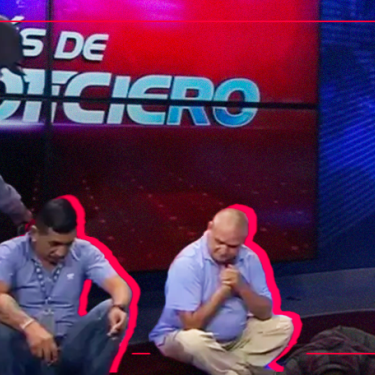Authorities must urgently protect reporters from escalation in violence in Ecuador

Reporters Without Borders (RSF) sounds the alarm about a disturbing increase in threats and attacks against the media in Ecuador, where it registered at least six cases in the space of a month. The Ecuadorean government must take urgent measures to guarantee journalists’ safety and protect the right to information.
Since the end of July, RSF has recorded at least six cases of attacks on journalists investigating the corruption surrounding the security crisis linked to the rise of organized crime in the country. Among the weapons most frequently used to silence journalists: threats, cyberattacks, or Article 396 of the penal code, which punishes anyone who "discredits" or "dishonors" another person, by any means, with 15 to 30 days of imprisonment.
“The escalation in violence against journalists, especially those investigating corruption, is a disturbing trend that threatens press freedom. The growing fear of reprisals prevents journalists from carrying out their mission to inform. We call on President Daniel Noboa's government to urgently take concrete measures to protect journalists and safeguard the population's right to information. It is also essential that all these attacks are thoroughly investigated and that those responsible are brought to justice.”
Attacks, threats and prosecutions used to harass reporters
Pressure on journalists is increasing. RSF has listed at least six cases that are emblematic of the deteriorating security climate for journalists:
- After La Posta news site reporters Andersson Boscán and Mónica Velásquez published a story on 22 August about possible corruption within the prosecutor-general’s office involving international drug trafficking, the prosecutor-general attacked the journalists verbally the next day, triggering a social media hate campaign inciting violence against them.
- Radio Noticias Cuenca reporter Segundo Cabrera has been subjected to threats in connection with his coverage of corruption-related stories for the past nine months.
- La Defensa news site reporter Álvaro Espinosa was verbally attacked and threatened on the social media X on 13 August in connection with a story published on 5 July about the background of former hydrocarbons deputy minister Valeria Arroyo and her links to a law firm involved in corruption cases.
- After web TV Nortvisión ran a story on 9 August about the non-payment of workers building a cemetery, which resulted in the cemetery’s construction being stopped, reporter Mayra Cora was accused by the priest in charge of the project of causing the dismissal of 45 workers. The priest went on to urge the workers to put pressure on Cora to reveal her source.
- Lo Del Momento Loja news site director John Lafebre has been the victim of a series of cyberattacks designed to remove his investigative reporting on corruption from the social media Facebook. The first incident was on 22 July, when one of his Facebook posts was deleted without explanation. Four more of his Facebook posts, detailing fraud cases, were deleted on 2 August.
- Jonathan Quezada, a journalist with the Teleamazonas TV channel and Más Gente news site, was sentenced on 29 July to 15 days in prison and a fine under penal code article 396 after being sued by the judge who was the target of his investigative reporting on alleged judicial corruption in the central city of Guaranda. Quezada was also threatened several times after his conviction: he received a letter at home warning him that he would be attacked in Guaranda’s prison.
The Ecuadorean NGO Fundamedios reported 37 attacks against the media in June and July, most of them by state representatives. At the same time, Periodistas Sin Cadenas, a local media defence foundation, documented 145 attacks against journalists from January to July, ranging from the blocking of reports to serious attacks.
At least 15 journalists have fled Ecuador for security reasons since 2021, according to the Latin American NGO Connectas. They include TC Televisión journalist José Luis Calderón, who fled to the United States after being one of the victims of the hostage-taking in January.
